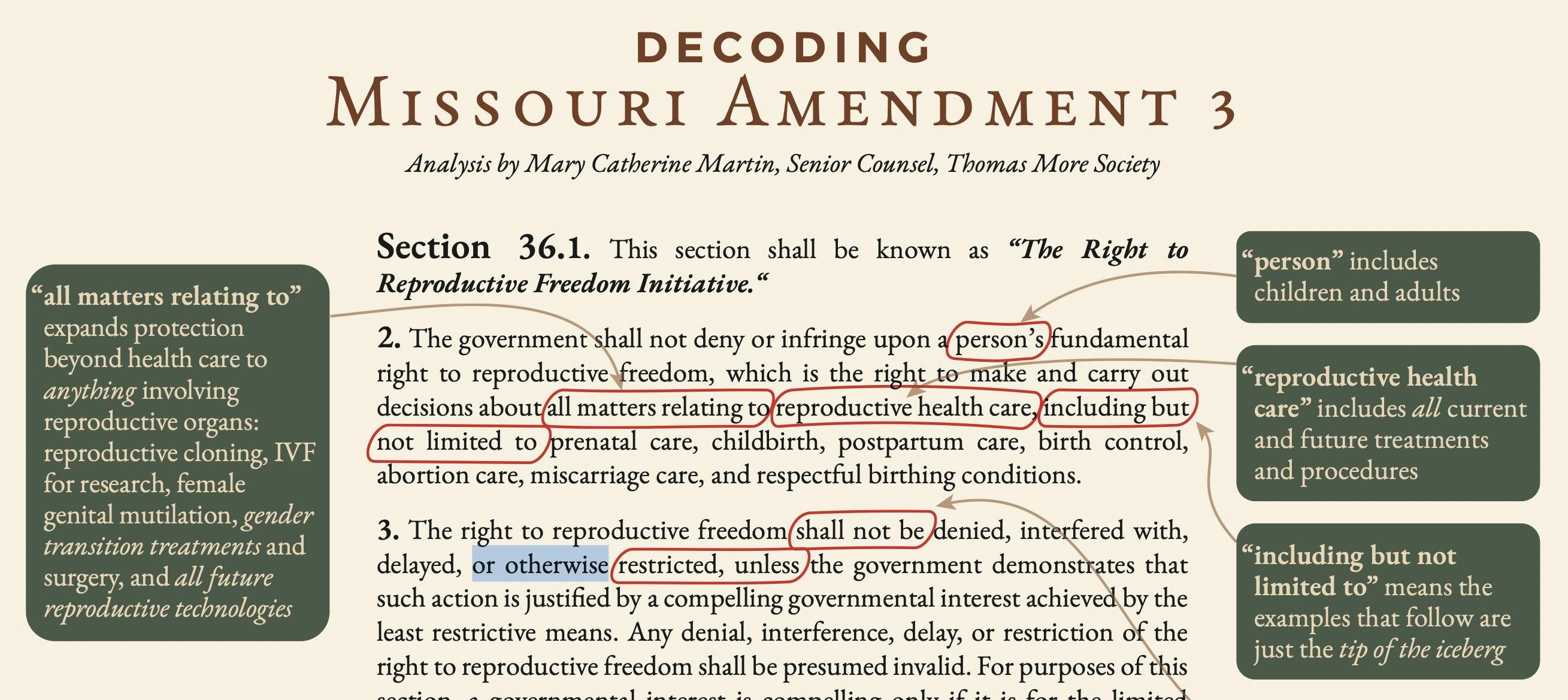This Ballot Initiative Could Undo Missouri’s Ban On Trans Procedures For Kids
A vaguely-worded Missouri ballot initiative could overturn the state’s ban on transgender procedures for children if approved by voters, a conservative legal group warns.
On Election Day, Missourians will vote on Amendment 3, a leftist-backed ballot initiative that restricts what laws can be passed on “all matters relating to reproductive health care.” In addition to upending Missouri’s robust pro-life laws, there are concerns that the amendment will erode parental rights and erase protections for children from transgender surgeries and hormone procedures.
Mary Catherine Martin, a lawyer with the Thomas More Society, told The Daily Wire that “nobody really knows the scope” of the amendment because of the messaging from its proponents and the broad language used in the amendment.
The amendment says: “The government shall not deny or infringe upon a person’s fundamental right to reproductive freedom, which is the right to make and carry out decisions about all matters relating to reproductive health care, including but not limited to prenatal care, childbirth, postpartum care, birth control, abortion care, miscarriage care, and respectful birthing conditions.”
Because of this wording, Martin says that the state’s shielding of kids from transgender procedures could be struck down, because the broad reference to reproductive health care could encompass procedures like puberty blockers, cross-sex hormones, genital surgeries, and mastectomies on girls who identify as boys.
“Gender transitions are matters related to reproductive healthcare. There’s really no way to define gender transition if it doesn’t involve the transfer of your reproductive organs, or exchange of your reproductive organs, alteration of your reproductive organs for something else,” she said. “And if it involves your reproductive organs, according to our federal government, that’s reproductive healthcare.”
Martin was referring to the Department of Health and Human Services’s definition of reproductive health care as care “that affects the health of an individual in all matters relating to the reproductive system and to its functions and processes.”
To spread awareness about the amendment, Martin and the Thomas More Society put out a “decoder” document that highlights the amendment’s over-broad language.

Credit: Thomas More Society.
Missouri law bars doctors from removing the breasts of girls who identify as boys or giving children puberty blockers and cross-sex hormones, which have been linked to heart issues, bone development problems, and fertility issues.
Missouri’s Republican Governor, Mike Parson, and Senator Josh Hawley share concerns about the broad impact of Amendment 3.
“This is about an effort to come into our schools behind your backs without your knowledge, to tell our kids that there’s something wrong with them and to give them drugs that will sterilize them for life, to push them toward procedures that will fundamentally change their bodies irrevocably for life,” Hawley warned in September.
MATT WALSH’S ‘AM I RACIST?’ NOW STREAMING ON DAILYWIRE+
These concerns have been dismissed by legacy media as “fear-mongering” and “highly unlikely.”
However, Martin points out that the language of the amendment places no limits on what “matters relating to reproductive health care” means.
“There’s literally no argument that all matters relating to reproductive health care does not include the alteration of your reproductive organs,” Martin told The Daily Wire. “There is nothing in the amendment that narrows that category.”
The amendment only needs over 50% of the vote to pass and be enshrined in Missouri’s constitution. The group pushing the amendment, Missourians for Constitutional Freedom, has raised nearly $31 million to promote its efforts, while opponents have raised just around $3.2 million.
Martin said that the amendment was not just about abortion, but “an ACLU Christmas list” that could lead to taxpayer-funded abortions and transgender surgeries, the end of single-sex bathrooms and sports teams, and the end of parental consent laws.


